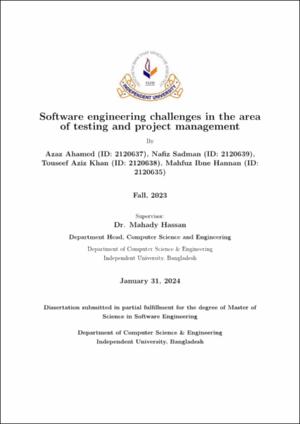| dc.description.abstract | The motivation behind this thesis stems from the rapidly changing landscape of software engineering, marked by two significant trends: the shift towards remote work and the escalating challenges in cybersecurity. In recent years, these trends have not only reshaped the way software development projects are managed but also how security is approached in an increasingly digital world. This thesis aims to delve into these areas, providing insights and practical solutions to address the emerging challenges and opportunities. The move to remote project management has been largely accelerated by the global COVID-19 pandemic, which forced organizations worldwide to rethink their operational models. This sudden shift has brought to the fore the need to understand and optimize remote work methodologies. The motivation here is to explore the dynamics of remote project management—how it impacts team communication, collaboration, productivity, and employee well-being. There is a growing recognition that remote work, while presenting numerous benefits, also brings unique challenges that require new management strategies and tools. Understanding these intricacies is crucial for organizations seeking to adapt effectively to this new normal. On the other hand, the rise of cybersecurity threats, particularly in government web applications, has become a pressing concern in the digital age. With the increasing reliance on digital platforms, the vulnerability of these systems to various cyber threats has become more pronounced. This thesis is driven by the need to address these security challenges, focusing on the effectiveness of automated testing tools in identifying and mitigating vulnerabilities. The motivation here is to contribute to the field of cybersecurity by providing a comprehensive analysis of how different tools perform against the OWASP Top 10 security vulnerabilities and to offer recommendations for their effective use. The integration of these two domains—remote project management and cybersecurity— presents a unique opportunity to explore how modern software engineering practices are evolving. This thesis is motivated by the desire to bridge the gap between theory and practice, offering insights that are not only academically robust but also practically relevant. It seeks to contribute to the ongoing discourse in software engineering, providing guidance and recommendations that can help professionals and organizations navigate the complexities of this rapidly evolving landscape. In essence, the motivation for this thesis is grounded in the desire to contribute to the advancement of software engineering practices in the face of changing work paradigms and the growing importance of cybersecurity. It aims to offer a comprehensive exploration of these areas, driven by the belief that understanding and addressing these challenges is key to the future of software development and security. | en_US |
